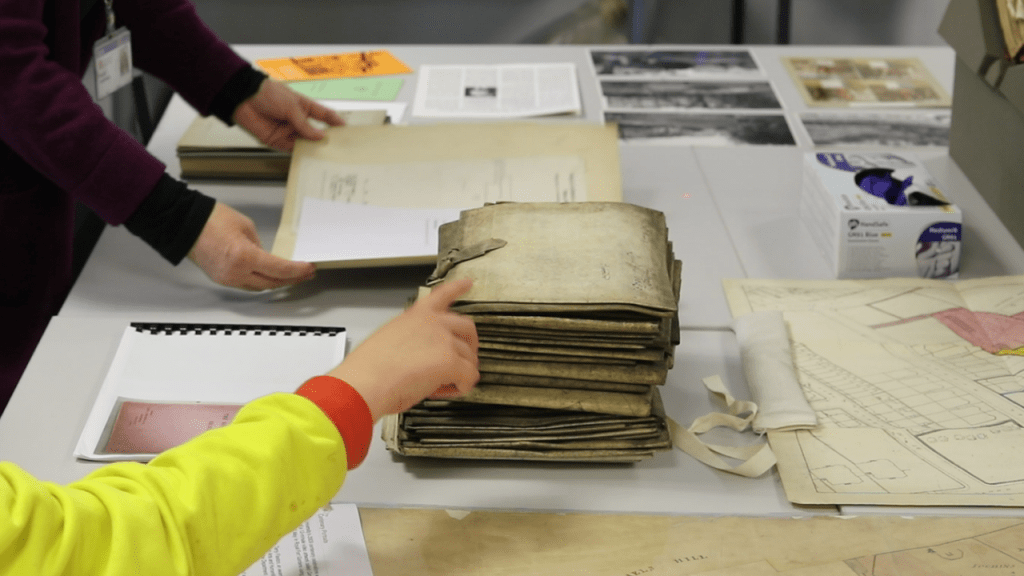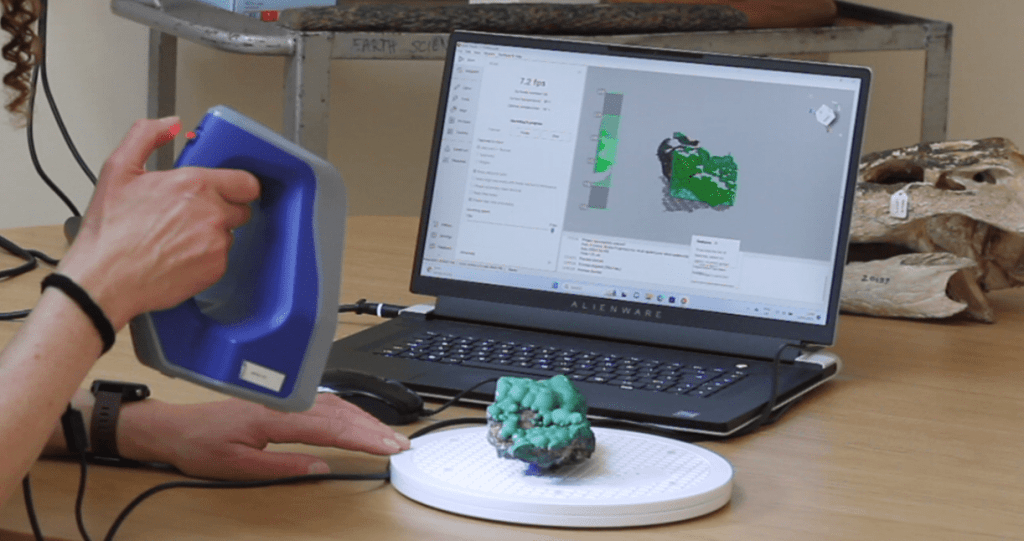Read the new blog post by Marcus Munafò, Associate Pro Vice-Chancellor – Research Culture, about our new policy on open research on The Research Culture Blog.
Category: Uncategorized
AI-based tools to support research data management
As datasets grow in size and complexity, traditional methods of data management may be insufficient to meet the demands of modern research. This is where AI-based tools can come into play, offering a suite of powerful capabilities to streamline and enhance data management processes. These tools are designed to address a variety of challenges that researchers face, from data collection and cleaning to storage, analysis, and security. The integration of AI in research data management can enable researchers to focus on higher-level like tasks such as hypothesis generation and theory building, whilst helping maintain scientific reproducibility. But despite these advantages, it is important to recognise that AI tools are not a panacea, and present both opportunities and threats to open research. For example, they require careful selection and implementation to address specific research needs, and the reliance on AI necessitates a degree of proficiency in data science, which might be a barrier for some researchers. There can also be concerns over data reuse, and questions about the motivations of major-league software developers. Nonetheless, we’ve noticed some AI-based software tools that seem to be achieving prominence. Below is a list of these. They are not intended as recommendations, but may provide a starting point for critical evaluation.
Finally, an interesting perspective on the use of AI in science was provided by UoB’s Pen-Yuan Hsing in his recent talk at the Reproducibility by Design symposium in Bristol on 26th June: “AI is not the problem – thinking about outcomes”.
Data Collection and Integration
Google Data Studio allows researchers to turn data into informative, easy-to-read, shareable, and customisable dashboards and reports. Its AI capabilities help integrate and visualize data from multiple sources.
Keboola leverages AI to integrate various data sources, automate workflows, and ensure data consistency, aiding researchers in managing complex datasets.
Data Cleaning and Preparation
Trifacta uses AI to simplify data wrangling, helping researchers clean and prepare their data for analysis. It identifies patterns and anomalies.
Talend provides AI-powered data integration and data integrity solutions, allowing researchers to clean, transform, and govern data efficiently.
Data Storage and Management
Datalore is an AI-driven collaborative data science platform that allows researchers to create, run, and share Jupyter notebooks in the cloud.
Azure Data Lake provides a scalable and secure data storage solution, with AI capabilities to manage large datasets and perform big data analytics.
RapidMiner uses AI to facilitate data mining, machine learning, and predictive analytics. It offers a visual workflow designer for data preparation, model building, and evaluation.
KNIME Analytics Platform is an open-source software that integrates various components for machine learning and data mining through a modular data pipelining.
GW4 Open Research Prize 2023: Theory of Change (from the Research Culture blog)
Read the new blog post by Christopher Warren, Assistant Research Support Librarian, about the GW4 Open Research Prize 2023 on The Research Culture Blog.
A Scholarly Works Policy for the University of Bristol
A new Scholarly Works Policy was approved at the April meeting of Senate. Here we set out the reasons for the policy, what it does, and how it will work.
Why are we introducing this policy?
The University is committed to improving research culture and – as part of this – supporting and enabling open research practices. The ability to publish our research Open access, ensuring free and unrestricted access to research outputs, is an essential part of this. Open Access has also become an expectation of research assessment exercises such as the REF, as well as a requirement of many funders (including UKRI and Wellcome).
Gold Open Access (paying publishers to publish the “version of record” Open Access via Article Processing Charges (APCs) and “transformative agreements”) is well established in many disciplines, but now green Open Access (self-archiving the author manuscript in an institutional repository) is becoming increasingly common.
The development of a robust green route to Open Access publishing promotes an inclusive research culture by making Open Access publishing available to all, regardless of academic position and current funding, and mitigates the risks of choosing to publish Open Access for individual researchers when navigating a complex publishing landscape. With most Russell Group Institutions implementing similar policies, it also strengthens our collective hand when negotiating with publishers for Open Access services.
The University’s new Scholarly Works policy uses the concept of “rights retention” to support authors in choosing to self-archive. With Rights Retention, authors can disseminate their work as widely as possible while also meeting funder and any future REF requirements.
What is rights retention?
Traditionally, publishers require that authors sign a Copyright Transfer Agreement. The only way to access the article after publication is to pay for it. Rights Retention is based on the simple principle that authors and institutions should retain some rights to their publications.
The policy provides a route for researchers to deposit their author accepted manuscript in our institutional repository, and, using a rights retention statement, both retain the rights within their work, and grant the University a licence to make the author accepted manuscript of their scholarly article publicly available under the terms of a Creative Commons Attribution (CC BY) licence.
What does this mean for researchers?
This policy should not involve a major increase in administrative burden for researchers. There will be very little change to researcher workflows – in fact, as part of the review of workflows Library Services is undertaking, there will be a reduction in the number of steps required for Pure submissions in many cases.
Library Services will be updating their webpages, guidance, training and instructional videos so that researchers can feel confident about using this policy. If you have questions, comments or feedback, please get in touch because it could be helpful in shaping this guidance. You can contact us by emailing lib-research-support@bristol.ac.uk
The Uncertain Space: a virtual museum for the University of Bristol
The Uncertain Space is the new virtual museum for the University of Bristol. It is the result of a joint project between Library Research Support and Cultural Collections, funded by the AHRC through the Capability for Collections Impact Funding, which also helped fund the first exhibition.
The project originated in a desire to widen the audience to some of the University’s collections, but in a sustainable way which would persist beyond the end of the project. Consequently, The Uncertain Space is a permanent museum space with a rolling programme of exhibitions and a governance structure, just like a physical museum.
The project had two main outcomes: the first was the virtual museum space and the second was the first exhibition to be hosted in the museum. The exhibition, Secret Gardens, was co-curated with a group of young Bristolians, aged 11-18 and explores connections between the University’s public artworks and some of the objects held in our rich collections.

The group of young people attended a series of in-person and online workshops to discover their shared interests and develop the exhibition. The themes of identity, activism and environmental awareness came through strongly and these helped to inform their choice of items for the exhibition.

Objects, images and audiovisual clips, to link with each of the public artworks, were selected from the Theatre Collection, Special Collections, the Botanic Gardens and from collections held in the Anatomy, Archaeology and Earth Sciences departments. For some of the choices, digital copies already existed, but most of the items had to be digitised by photography or by scanning, using a handheld structured light scanner. The nine public artworks were captured by 360 degree photography. In addition, the reactions of the young people were recorded as they visited each of the public artworks and these are also included in the exhibition.

As the virtual museum was designed to mimic a real-world exhibition, the University of Bristol team and the young people worked with a real-world exhibition designer, and it was found that designing a virtual exhibition was a similar process to designing a real-world exhibition. Some aspects of the process, however, were unique to creating a virtual exhibition, such as the challenges of making digital versions of some objects. The virtual museum also provides possibilities that the real-world version cannot, for example the opportunity to pick up and handle objects and to be transported to different locations.
Towards the end of the project, a second group of young people, who were studying a digital music course at Creative Youth Network, visited the virtual museum in its test phase and created their own pieces of music in response. Some of these are included in a video about the making of the museum.
The museum and first exhibition can be visited on a laptop, PC or mobile device via The Uncertain Space webpage, by downloading the spatial.io app onto a phone or VR headset, or by booking a visit to the Theatre Collection or Special Collections, where VR headsets are available for anyone to view the exhibition.
We are looking forward to a programme of different exhibitions to be hosted in The Uncertain Space and are interested in hearing from anyone who would like to put on a show.
You can read more about the making of The Uncertain Space and its first exhibition from our colleagues in Special Collections and Theatre Collection:
Our collections go virtual!
Digitising for the new virtual museum: The Uncertain Space
Finding Open Access Research
It has become common practice for researchers to make a copy of their research articles available for free online. Many of these ‘Open Access’ papers are held in institutional or subject repositories – which can make them challenging to find. However, there are several useful tools designed to make this a lot easier.
Useful Open Access Resources
CORE
CORE aggregates the Open Access full text content of many Open Access repositories, including PubMed Central, so that you can search and read it all in one place.
Searching here will help you find many articles that you can open and read for free. CORE also contains electronic PhD theses and other works that are hard to find elsewhere.
EndNote Click
EndNote Click is an extension for your internet browser that quickly tells you if you have access to a version of a journal article that you are looking at. It detects when you are looking at an article’s page and if you have access, either through your library’s subscriptions or through an Open Access version, it will provide a link to the document.
This is generally the most convenient way to find Open Access work if you’re used to searching academic journals and databases. The extension will work in Google Chrome.
Unpaywall
Unpaywall is another useful browser extension. It adds an icon to the right-hand side of any page where it detects an academic article. The icon indicates whether there is an Open Access version available and clicking it will take you to the appropriate document.
Unpaywall draws on slightly different sources to Kopernio, but does not check if you have access through your university. It may be helpful to install both. The extension will work in Google Chrome and Firefox.
Open Access DOIs
If you’re familiar with DOI numbers, then you know that you can use them to link to articles. (e.g. http://doi.org/10.1038/ng.3260 ) However, this will usually only link you to the publisher’s version, which might try to charge you for access. If you use the Open Access DOI format instead – (http://oadoi.org/10.1038/ng.3260) – you can create a link to an Open Access version of the article, if one is available.
This is a good way to find out if there is an Open Access version. It’s also a good way to share an Open Access paper with someone else who might not have access to the publisher’s version.
DOAJ (Directory of Open Access Journals)
DOAJ curates a list of Open Access journals across a range of subjects. If you want to find Open Access journals within your discipline, this is a good place to look. You can also use their search function to find resources from across their database of journals.
They provide criteria for good practice in Open Access journals and can be a useful place to check the quality of a new Open Access journal that you weren’t previously aware of. Inclusion in DOAJ implies that the journal follows their principles and is therefore likely to be a reputable source.
DOAB (Directory of Open Access Books)
DOAB is a collection of Open Access books from a range of subjects and publishers. It is a good place to search if you are looking for more in depth Open Access materials and is a useful companion to a DOAJ or CORE search.
Ethos
The Electronic Theses Online project run by the British Library collects electronic theses from UK university and makes them available through Ethos. You can search Ethos to find results from a large collection of PhD theses. The search may also return works that are currently under an embargo, but you can limit your search to Open Access resources if necessary.
How much is our open access research downloaded?
In October 2017 Our link to the IRUS stats portal was broken. Thanks to some recent changes (including the new look for Explore Bristol Research) this link has been restored. This means we can start analysing how much use our Open Access Research gets.
A lot of work has gone on in that time and more people are using our resources than ever before. I’ve picked out a few interesting points below.
Downloads now compared to 2017
In May 2017, there were 16,619 downloads from visitors to Explore Bristol Research.
In May 2020 there were 69,186!
It’s not because of the lockdown, either. January was actually higher with 75,541! Open access has clearly taken off in the last three years and more people are using our work than ever before.
Top countries people are downloading our work from in 2020:
- United Kingdom,
- United States
- China
- India
- Germany
- Australia
- France
- Canada
- Netherlands
- Spain
Most Downloaded Records so far in 2020:
“The Consumer Rights Act 2015 – a bastion of European consumer rights?” an article by Paula Giliker: 4299 downloads
“Vicarious liability in the UK Supreme Court” a book section by Paula Giliker: 3932 downloads
“(Trans)forming single gender services and communal accommodations” an article by Peter Dunne: 2557 downloads
“A long, hard road to go by : a study of the support work carried out in women’s aid refuges” a thesis by Hillary Anne Abrahams: 2473 downloads
“Psychometric properties and diagnostic usefulness of the Addenbrooke’s Cognitive Examination-Revised in a Chilean elderly sample” an article by Carlos Muñoz-Neira: 2447 downloads
“Borderline personality disorder: an update for neurologists” an article by Paul Moran: 2275 downloads
“The Politics of Industrial Policy: The Case of Malaysia’s National Automotive Policy” a thesis by Firdaus Suffian: 1947 downloads
“Deviant Security: The Technical Computer Security Practices of Cyber Criminals.” a thesis by Erik Van De Sandt: 1602 downloads
“The changing face of English freemasonry, 1640-1740” a thesis by Peter Kebbell: 1480 downloads
“Poverty, gender and violence in the narratives of former narcos: accounting for drug trafficking violence in Mexico” a thesis by Karina Garcia: 1330 downloads
I hope this goes some way to demonstrate how far our Open Access research travels and how many people benefit from it. For more information on how to make your work open access visit: http://www.bristol.ac.uk/staff/researchers/open-access/
Research Support at the Jean Golding Institute Data Week 2019
The Jean Golding Institute’s Data Week 2019 (20th – 24th May) is a week of workshops, talks and other events on data science and reproducible research, including data analysis, visualisation, coding and more. The Library’s Research Support team is running two events as part of Data Week – our regular “Introduction to Open Research” and a brand new workshop on sensitive data: “Managing ethically sensitive data: from planning to sharing”. The full programme for Data Week is available at https://www.bristol.ac.uk/golding/get-involved/data-week-2019/.
The “Introduction to Open Research” workshop is aimed at postgraduate and early career researchers and acts as a basic introduction to Open Access (OA), research data management, and research metrics. Attendees will cover OA and research data sharing requirements of the Research Excellence Framework (REF), the University, and of major funding bodies. There will be an overview of the different research support systems in place at the University to help researchers meet these requirements, including the Research Data Storage Facility (RDSF), the data.bris Research Data Repository, and a live demonstration of how to add publications to Pure. Finally, attendees will be given a brief introduction to key research metrics, how these are calculated, and how they can access and benchmark their personal research metrics data.
“Managing ethically sensitive data: from planning to sharing” is a new workshop aimed at researchers at any career stage who are dealing with ethically sensitive data; that is, data involving humans or at-risk species. In practice, it is likely to be most relevant for researchers in health and social sciences working with human research participants. Attendees will learn how to safely deal with personal data in a research context, including participant rights and researcher responsibilities with regards to the General Data Protection Regulation (GDPR) and the Data Protection Act 2019 (DPA 2018), what services the University provides to help researchers collect and store sensitive data, and how to construct consent forms and patient information sheets that will permit data sharing at the end of a project. Finally, attendees will be given an introduction into methods for preparing sensitive data for sharing: this will include an overview of documentation requirements and the different data sharing platforms and mechanisms available to researchers, as well as an introduction to the concepts of formal, statistical and functional anonymisation and how these can be applied to datasets to reduce disclosure risk.
We’ve had a great deal of interest in the latter workshop, and while this weeks’ event is sold out we do plan to repeat the sensitive data workshop later in the year. We’ll also be expanding our online sensitive data bootcamp to include some of the issues covered in the live workshop.
March: Focus on Health Science
 We have visited a lot of health researchers over the last month. Clinicians and researchers are spread across the University’s sites, so we’ve focused on providing our Open Research workshops for Health Sciences researchers where they work, starting in Canynge Hall and Dorothy Hodgkin Building. We have future plans to run the workshop at hospital sites such as Southmead, to support clinical researchers in situ.
We have visited a lot of health researchers over the last month. Clinicians and researchers are spread across the University’s sites, so we’ve focused on providing our Open Research workshops for Health Sciences researchers where they work, starting in Canynge Hall and Dorothy Hodgkin Building. We have future plans to run the workshop at hospital sites such as Southmead, to support clinical researchers in situ.
The workshops cover Open Access publications and funder requirements, depositing papers and theses in Pure, Research Data Management, the data.bris repository, the Research Data Storage Facility and researcher metrics, so it’s a broad overview of how researchers can take steps be more open across the board. Plenty of questions came up, and it was really thought-provoking to hear researchers talk about their different career paths and their motivations to do research.
In addition to the workshops, we were invited to talk at the Centre for Academic Primary Care’s (CAPC) monthly meeting about our process for sharing sensitive data with external researchers. This question arises not only because researchers at other institutions hear about research at Bristol, but also because of an increased requirement from funders and publishers to provide a means of access to data from publicly funded research. We often receive queries from researchers working with sensitive data and whilst the themes are mostly the same, the circumstances of each case often requires careful consideration, so it was a great opportunity to learn about the issues CAPC researchers face and discuss how we can support them.
At CAPC we defined sensitive data in the context of research involving human participants. We discussed the circumstances where anonymisation is either not possible, or where anonymising would strip value from the dataset. Researchers were particularly interested in the process we have for sharing sensitive data through the research data repository, data.bris, and how we have access levels specifically designed for this purpose. We talked about how decisions to share are made via a Data Access Committee, how we check researchers are bona fide, and what is covered by data access agreements. We were also able to emphasise the importance of getting consent sheets worded in a way that makes it simple for researchers to share sensitive data. Off of the back of this talk, we’ve assisted three researchers with their consent form wording and ethics applications and prevented snags further down the line at the publication stage, so it was a worthwhile visit.
It also gave us the opportunity to give researchers a taster of the kinds of issues we’ll be covering at our upcoming workshops ‘Managing ethically sensitive research data: from planning to sharing,’ and interest was piqued so spaces filled very quickly! However, there are waitlists running and we will be repeating the workshop in the Autumn term and beyond.
New Wellcome Trust Open Access Policy from 2020
In early November 2018 the Wellcome Trust announced a new Open Access policy. It will apply to articles submitted for publication from 1st January 2020.
Key points and changes
1. Date for implementation: 1 January 2020 – in the meantime authors should continue to comply with the current policy.
2. Wellcome Trust has joined cOAlition-S, and this is the first major funder’s policy that aligns with Plan-S.
3. The policy applies to articles that include original, peer-reviewed research, but not monographs and books.
4. All Wellcome-funded articles must be made freely available through PMC and Europe PMC at the time of publication.
5. All articles, even those where no Article Processing Charge (APC) has been paid, must be published under a CC-BY licence.
6. To be compliant authors can publish:-
a) In any fully OA journal indexed in Directory of Open Access Journals (DOAJ) + depositing in PMC/EuropePMC + publishing with CC-BY.
b) In any subscription journal with a green route which allows deposit of Author Accepted Manuscript (AAM) in PMC & EuropePMC without embargo and with CC-BY.
c) With any publisher with a ‘transformative agreement’ during the 2-year period Jan 2020 to Dec 2021.
7. Wellcome will no longer pay OA publication costs in ‘hybrid’ journals (subscription journal with paid OA option).
8. Where there is a significant public health benefit to preprints being shared widely and rapidly, these preprints must be published before peer review, on an approved platform that supports immediate publication of the complete manuscript, and under a CC-BY licence.
9. Wellcome-funded organisations must sign or publicly commit to the principles of the San Francisco Declaration on Research Assessment (DORA) or an equivalent. (University of Bristol has signed DORA).
10. Further information from Wellcome is awaited regarding a list of compliant preprint platforms, a list of approved Jisc Collections transformative OA agreements, and information on how to check if specific journals are compliant with the policy.
The new policy and FAQ can be found on the Wellcome’s Open Access policy page.
For more information please contact lib-research-support@bristol.ac.uk

